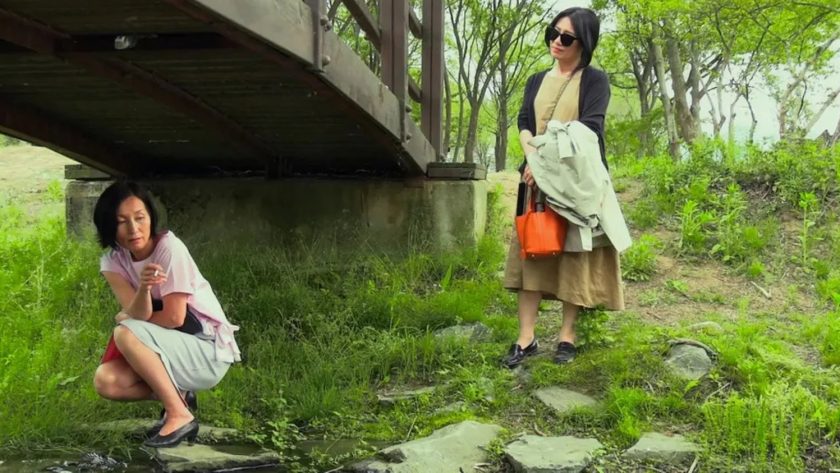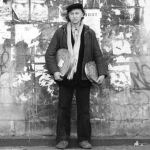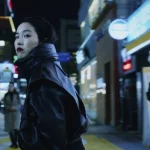London Korean Film Festival returned for its 16th edition. From new releases to hits from renowned Korean directors, the FilmSoc Blog reviews a selection of films showing at this season’s festival.
Tomi Haffety reviews Hong Sang-soo’s latest feature, a beautifully subtle reflection on everyday transience.
Allow me to paint you a picture of Leicester Square on a Saturday night. There are headache-inducing bright lights, a cacophony of various street performers competing with each other for who can be the loudest act, and a swarm of over-excited tourists queueing outside M&M World like it’s London’s best and oldest attraction. Emerging from this inferno and into the calming realms of Hong Sang-soo and his renowned minimalist filmmaking, my appreciation for cinema’s ability to transport you to another dimension has never been more prevalent.
In Front of your Face is Hong’s second feature this year, with Introduction having premiered at the Berlinale in January. An expert filmmaker, the Korean director captures closely observed human dialogue unlike any of his contemporaries, each film a modern homage to Rohmer’s skilful stillness of conversation, and with this his twenty-sixth feature, his style has been firmly cemented in the world of minimalist drama. This film, which I enjoyed considerably more than Introduction, follows Hong’s signature style with little deviation. I expected nothing less. The opening few minutes of this nostalgic tale are powered by silence, and a focus on our protagonist Sangok (Lee Hyeyoung) as she observes her sister Jeongok (Yeunhee Cho), still sleeping. Filmed through extended takes that allow for deeper insight into both dialogue and Sangok’s inner monologue, the premise is one that left me pausing to ponder the impermanence of everyday life. Because she has lived in the US for some time, Sangok is shocked at Seoul’s development, her nephew’s adulthood, and the fragility of her relationship with her sister. It was this relationship that was most touching; as someone with three sisters, the poignancy of the hand-holding, gentle compliments and comedic insults was imbued with love and a craving for each other’s company after being separated for so long. Hong is, as ever, incessant in showing the dynamics of each character’s relationships in detail, relying on the actors’ emotional dexterity and expertly improvised lines of situational dialogue.
The dialogue itself is the main focus of the story, progressing as though the actors were only there to give their words the power to be heard. Meaning is suffused so intricately into each line that it’s exhausting to wonder whether Sangok’s admittance of: ‘I don’t exercise… I don’t do anything’ is a subtle reference to her static middle age and floundering sense of self, or literally a complaint that she should exercise more. Personally, I can’t help but romanticise Hong’s films, and so opted for the former: minimum gesture for maximum reflection. This is a film about living, dying, talking, laughing, and crying. It explores three relationships, one of sisterhood, one of male and female companionship, and one of the relationship with the inner-self. Sangok’s soliloquies, thanking an unseen being for her graces and fortunes, feed into the story as though we were gaining secretive insight into a second layer of the story.
The second half takes place in a café, empty apart from our protagonist and film director Jaewon (Kwon Haehyo, a Hong regular), as he discusses his desire to film Sangok and capture the enchantment that he felt upon seeing her act in her one-hit wonder, a film from the nineties. Sangok appears to have forgotten her own skill and allure as an actress and carries this flattery with reluctance as she turns down Jaewon’s offer, and proceeds to drink more Chinese liquor as the day wanes to a rainy close. There are moments throughout this scene, with the camera planted at one angle for over thirty minutes, albeit for a signature zoom to remind you that this is the emotion you should be focusing on, that explore the sensibility of growing old and the preservation of the sanctity of life. Because everyday reality is repetitive, mundane even, we are always forced to find deeper meaning among quotidian actuality, and it is the same for Hong’s storytelling. Is it important that Sangok’s blouse becomes stained and that she spends the meeting with Jaewon restlessly covering that spot? Should I focus on the fact that they only ordered two bottles of Chinese liquor but in the next shot, have four empty bottles on the table? When the director admits he wants to sleep with Sangok, does this make his flattery of her as a professional redundant? Although I will never know what Hong is asking the viewer to depict, I take comfort in the knowledge that there are some questions in life for which we will never find the answers, and this is expertly reflected in the lacuna of this auteur’s work.
The defining feature of Hong Sang-soo’s work is also obvious in the decisions made before filming starts. Using the same actors across most of his features gives each film a connection to the rest, as though they could all be seen as episodes in the series that is his mastery. There is consistency too in the focus on sound — or lack thereof — that is being emulated across modern South Korean cinema. But the most powerful attribute that collates all of his films is the ceaseless dialogue, whether between people or a single person and their thoughts, because it recognises that we are always thinking, that there is always a voice in one’s head that gives one’s feelings brevity, and Hong beautifully captures this with a cognisant insouciance. Cinema is one of the easiest ways to be moved by human creativity and to awe at the power that this creativity can have at making you feel like your own trivial life is interesting. After all, one man’s boring conversation is another’s inspiration for a realist exploration into the human condition. At the close of the film, I wished that the world I was going back into was a rainy Seoul evening, and not the pandemonium of Leicester Square.
Watch the trailer for In Front of Your Face here:




